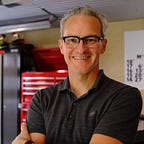memo: disruptive types
subject: future of school
Why we need your help building the future of school
Dear disruptors in tech, food, energy, the arts and everywhere else,
We need you in education. A decade of breathtaking charts and smart people explaining how bad US schools really are hasn’t done a damn thing to redirect our slow march to stagnation.
So I’m asking you directly, “get involved and help us.”
We need you reminding us its worth the effort to disrupt something when it has grown obsolete.
Three years ago this week, I started planning for our first launch cohort at 4.0 Schools — an early-stage education incubator based in New Orleans and New York City.
We’d accepted aspiring entrepreneurs into our startup and new school incubation program, and with 100 schools and startups under my belt I thought planning would be pretty easy.
But nothing came to me. My head and my screen were blank. Crickets chirped in the yard. How could I have nothing to say about the future of school? It turns out that I’d spent most of my career answering an increasingly irrelevant question: “How do we make today’s schools better?”
But the entrepreneurs who’d signed up for our first three-month Launch intensive were asking a very different question: “What is the future of school?” I had no idea how to answer that one. I knew how to make the existing approach to school better, but I’d never asked what school could be like if we started over.
So we went into that first cohort making it up. Lucky for us, they put up with our messy first draft. Their honest feedback and help from foodies, hackers, artists and designers we knew in New Orleans helped us focus on three skills everyone involved in building the future of school should master — skills that remain the foundation of everything we do at 4.0:
Empathy. We design schools and education startups to meet specific needs that actual humans have, especially kids and parents.
I certainly didn’t traffic in empathy in my early years as a school reformer. I thought I had a pretty good idea about which schools were good for which kids, and I certainly didn’t think about putting kids and parents at the center of my school planning. I realize now that listening to my users — kids and parents — is the only way I can break free from current constraints about how we do school.
Unbundling. We think the existing one-size-fits-all model misses lots of specific needs that can be better met by more specialized providers.
We should avoid acting like we’re the first people to suggest school could be better. Unbundling the one-size-fits-all monolith that dominates our assumptions about school today requires an understanding of how it got the way it is. Read Andrew Parker, Chris Dixon and Benedict Evans on unbundling in consumer internet. This can be good for consumers of school, too.
Prototyping. We don’t waste time getting things perfect before delivering solutions. We focus on getting a simple, messy version in front of real people and adjusting to their feedback instead of obsessing in a vacuum.
Sharing a version of your product or service with real customers before its perfect? That just does not compute for most educators. In our heads is a very loud voice shouting things like “KIDS’ LIVES ARE AT STAKE!” The pressure to make it perfect every time for every kid creates a culture of fear where everyone’s terrified to test new ideas or experiment with better ways to engage kids.
If you code, design or cook, you can probably use these words — empathy, unbundling, prototyping — in a sentence. If you teach, you’ll probably need to find a spelling bee to hear them.
Better dialog between people trying to disrupt obsolete approaches to school and people who’ve led disruptive change elsewhere can breakdown that culture of fear and encourage passionate people to rise up and take a swing at building the future of school.
If you — disruptors — started working on the future of school, we might be able to deliver what our users — our kids — want and deserve. We might be able, in the words of an 8-year old I know, to make “school more like paradise.”
— Matt Candler, founder and CEO of 4.0 Schools.
